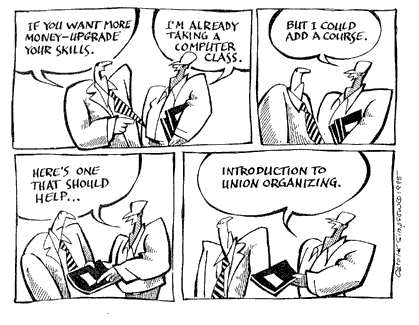
used by permission: CartoonWorks
I would like to bring to your attention something about, Cesar Cuevas. He called for a meeting on
I am being discriminated at FedEx in
Good reliable sources have reported that they witness FedEx Freight trailers crossing the
The next job you save may be your own!
Also meetings were held on the
BE WISE AND ORGANIZE!
THE TIME TO ORGANIZE IS NOW!
Secretary Treasurer Patrick D. Kelly
September 2007 Report
Stop Cross Border Trucking! Call or e-mail your U.S. Senators and other Representatives and urge them to defeat this travesty (Senator Barbara Boxer 213-894-5000 www.boxer.senate.gov and Senator Diane Feinstein 310-914-7300 www.feinstein.senate.gov). If you live in Nevada contact Senate Majority Leader Harry Reid at 702-388-5020. Be sure to register to vote and sign-up for DRIVE. This is nothing more than union busting directed at the Teamsters Union, ILWU and ILA. Thank you for your support of our Executive Board and our Local Union.
The origins of Labor Day are more than a century old.
The first Labor Day parade in New York City was held in September 1982. Two men are credited with playing an important role not only in bringing about the parade but the holiday as well. Matthew Maguire, a machinist from Paterson, N.J., and Peter J. McGuire, a New York City carpenter who helped found the United Brotherhood of Carpenters and Joiners, are said to have suggested a holiday to honor working people in the United States. In 1887, Oregon became the first state to make Labor Day a legal holiday, and in 1894, President Grover Cleveland signed a bill making Labor Day a national holiday.
How unions help all workers
by Lawrence Mishel and Matthew Walters
Unions have a substantial impact on the compensation and work lives of both unionized and non-unionized workers. This report presents current data on unions' effect on wages, fringe benefits, total compensation, pay inequality, and workplace protections.
Some of the conclusions are:
• Unions raise wages of unionized workers by roughly 20% and raise compensation, including both wages and benefits, by about 28%.
• Unions reduce wage inequality because they raise wages more for low- and middle-wage workers than for higher-wage workers, more for blue-collar than for white-collar workers, and more for workers who do not have a college degree.
• Strong unions set a pay standard that nonunion employers follow. For example, a high school graduate whose workplace is not unionized but whose industry is 25% unionized is paid 5% more than similar workers in less unionized industries.
• The impact of unions on total nonunion wages is almost as large as the impact on total union wages.
• The most sweeping advantage for unionized workers is in fringe benefits. Unionized workers are more likely than their nonunionized counterparts to receive paid leave, are approximately 18% to 28% more likely to have employer-provided health insurance, and are 23% to 54% more likely to be in employer-provided pension plans.
• Unionized workers receive more generous health benefits than nonunionized workers. They also pay 18% lower health care deductibles and a smaller share of the costs for family coverage. In retirement, unionized workers are 24% more likely to be covered by health insurance paid for by their employer.
• Unionized workers receive better pension plans. Not only are they more likely to have a guaranteed benefit in retirement, their employers contribute 28% more toward pensions.
• Unionized workers receive 26% more vacation time and 14% more total paid leave (vacations and holidays).
Unions play a pivotal role both in securing legislated labor protections and rights such as safety and health, overtime, and family/medical leave and in enforcing those rights on the job. Because unionized workers are more informed, they are more likely to benefit from social insurance programs such as unemployment insurance and workers compensation. Unions are thus an intermediary institution that provides a necessary complement to legislated benefits and protections.
1. IS THERE A RULE?
2. DID THE EMPLOYEE VIOLATE IT?
3. WAS THERE NOTICE OF THE RULE?
4. IS THE RULE REASONABLE?
5. WAS THE RULE APPLIED UNREASONABLY?
6. WAS THERE A FAIR INVESTIGATION?
7. EQUAL TREATMENT WITH OTHERS?
8. IS THE DISCIPLINE-UNREASONBLE?
September 9, 2007 8:01 PM